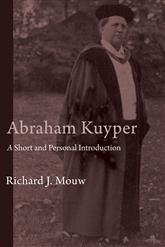
The third post in a series drawing from and interacting with Richard Mouw’s Abraham Kuyper: A Short and Personal Introduction (Eerdmans, 2011).
If Christ’s concern, and therefore our concern is the redemption of the whole of Creation, how do we go about this? “How are we as Christians to work at redeemed cultural activity?” (Mouw, 15) The simple answer is that we dwell in the love of Christ and share His will. Before we get into the nuances of this answer, we need to look at the nature of Creation.
Creation is one, but at the same time is many. We are all creatures created by God through Christ. This is what unifies us; the desire to continue in the grace bestowed upon us. Yet, in our unity we are many. Kuyper coined a phrase for this, which can be translated to pluriformity. We conform to each other in our plurality. Differences should not be overcome, but celebrated.
[Kuyper] was convinced that God himself loves many-ness. Indeed, on his reading of the biblical account, the Creator had deliberately woven many-ness into the very fabric of creation. (17)
![Creation - Day 4, from Art in the Christian Tradition, a project of the Vanderbilt Divinity Library, Nashville, TN. http://diglib.library.vanderbilt.edu/act-imagelink.pl?RC=46169 [retrieved January 23, 2014].](https://blog.emergingscholars.org/wp-content/uploads/2014/01/Creation-Day-4.jpg)
This many-ness, according to Kuyper, “was necessary for created life to flourish in a fresh and vigorous manner.” (18) This differentiation breeds interdependence and not independence. All the realms of Creation have a part to play in the drama of redemption and no one realm can bring about fullness of life without reliance on the other realms.
However, in our fallen state, we crave independence and see our own realm (whether personal or cultural) as the only realm that matters. We have been fooled into thinking that we can, by ourselves, seek fulfillment. Sin did not put an end to the many-ness, it only perverted it. In the state of fallenness, we see difference in two different ways, both of them conditioned by sin.
[The first] sinful strategy is simply to affirm many-ness without seeing any overall coherence to the splendidly complex reality in which we find ourselves. (18)
In doing this, we see all of life to be fragmentary and to not influence the other parts of our lives. We see this not only in the world writ large but also in those that are cultural Christians. We pray on Sundays and curse on Mondays, leaving our sins at the doors of the church and picking them back up again on our way out, for religion is only for certain circumstances. We then further break up our lives, being a good spouse only in the home, ethical only when others our watching, and honest when it suits us. We break our lives down into moments and do not let those moments interact. This leads us to something close to a multiple personality disorder where we have difficulty knowing who we are, as we are not one but many.
[A second strategy is] to try to get rid of some or all of the many-ness by squeezing together, in a way that this or that element of the many-ness begins to choke out the others.” (19)
We collapse everything down to sameness. This can be seen in the field of comparative religion, where we seek to find the common ground of all religions. This could possibly not be a bad thing, but it inevitably leads us to declare something like “All religions are the same, all paths lead to God.” Another side of this is being “devoted to the service of something within the the creaturely realm, treating that created something as if it has an ultimate worth that belongs properly to God alone.” (18-19) We becoming environmentalists to care for the well-being of animals but end up spending more time and resources caring for plants and animals than humans. We become humanists caring more about the fate of humans than the fate of the earth. The one, however that rears its head is individualism. We care for ourselves and devote time and energy to our well-being forgetting to care for all of creation that surrounds us.
Both of these strategies lead us into idolatry, not seeing Creation for what it is and worshiping something that is not God. Even though we focus on something that is good in Creation, we remove the Goodness by making it either bland (the first strategy) or too unique (the second strategy). Another danger is that we blur the lines between Creature and Creation. We either make the Creature the Creation or the Creation the Creature. Either way, there is no longer the biblical vision of God and all that remains is a rebellious and idolatrous vision of God.
 The question then remains, how do we participate in the redemption of the world? The answer that Kuyper gives us: celebrate the many-ness of Creation and let the different realms flourish in their own way. In doing so, all while be united and brought together in the love of God. Not only should we not try to tear apart that which God put together, we should not try to squeeze together what God kept separate.
The question then remains, how do we participate in the redemption of the world? The answer that Kuyper gives us: celebrate the many-ness of Creation and let the different realms flourish in their own way. In doing so, all while be united and brought together in the love of God. Not only should we not try to tear apart that which God put together, we should not try to squeeze together what God kept separate.
The next post in the series will explore Kuyper’s Sphere Sovereignty.
Adjunct Professor of Philosophy at Grand Rapids Community College and Kendall College of Art and Design. MA in Philosophical Theology from the Institute for Christian Studies, BA in Philosophy and Worldview Studies from Cornerstone University.

Leave a Reply